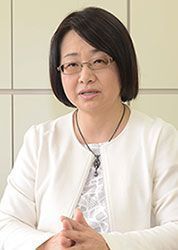One year after the rape and murder of a woman by a U.S. military contractor, wounds of the victim’s family have yet to heal

On April 21, at the Kokoro Law Office in Naha, Attorney Naoko Murakami, counsel for the family of the deceased, looks back one year after the case of rape and murder of a woman by a U.S. military contractor
April 28, 2017 Ryukyu Shimpo
We interviewed attorney Naoko Murakami, who represents the family of the deceased in the case of rape and murder of a woman by a U.S. military contractor, which occurred one year ago.
◇ ◇
― How are the family doing now?
“From the perspective of the family, no progress has been made at all. Pretrial arrangement procedures have begun, but there is still no knowing when the trial will start or when a verdict will be made. The case remains unsolved and there has been no compensation. The family feels great loss and their wounds are not healed. They have suffered tremendous psychological damage, making it hard to work, so their income has taken a hit.”
― The defendant has made comments that were hurtful to the family.
“The family is very hurt and very indignant. They asked why he would unilaterally make such proclamations at that timing through the mass media. The two things required to support the family are to properly punish the defendant and to compensate the family and the victim, who have been harmed, in addition to ensuring that they receive emotional care.”
― Has there been any progress in terms of compensation?
“We have no idea what will happen. It is hard to move forward with procedures for compensation without a ruling in a criminal trial. It is also not clear whether the Japanese and U.S. governments would provide compensation pursuant to the Status of Forces Agreement (SOFA) should the defendant be unable to pay. The family has been worried and made an inquiry to the Okinawa Defense Bureau early on, but there has been no response whatsoever.”
― What do you think about the incident turning into a political problem?
“As the family commented at the prefectural people’s rally [last year], they feel that the tragedy was a result of the U.S. bases being in Okinawa. When discussions began about limiting the scope of military-affiliated persons with SOFA status, the family was worried that they might not receive compensation. As their representative, I am encouraged that many Okinawans share the family’s pain. I want people not to forget the incident and to think about why it happened.”
― What are your hopes for reporting on the issue?
“Immediately after the incident, the family was interviewed when they were still very shaken and unable to process their emotions. Reporters went to their home and refused to leave until they got an interview, so they suffered secondary damage as a result. If victims caught up in reporters’ competition to get an interview refuse to speak, information that should be spread will never make it to the public. It is necessary to establish a reporting system and rules that align with the family’s needs. When interviewing the victims, I want reporters to stand in the victims’ shoes.”
(English translation by T&CT and Sandi Aritza)
Previous Article:Okinawans call for Kadena Air Base removal on anniversary of murder victim’s disappearance
Next Article:3,000 take part in protest rally in Henoko for first time since start of sea wall construction, refusing to bow to government pressure
[Similar Articles]
- Two years after murder by ex-Marine, wounds of the bereaved family have yet to heal
- Japan exploring special measures to obtain civil damages from the U.S. in the 2016 murder of an Okinawan woman
- Victims of the Battle of Okinawa to take their case to Japan’s Supreme Court after Japan found not liable in reparation lawsuit
- U.S. base worker should face up to his crime in court
- Japan determines U.S. contractors are also “employees,” in compensation case for murdered woman
 Webcam(Kokusai Street)
Webcam(Kokusai Street)


